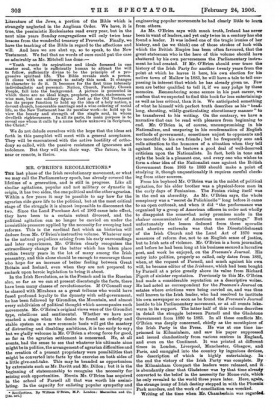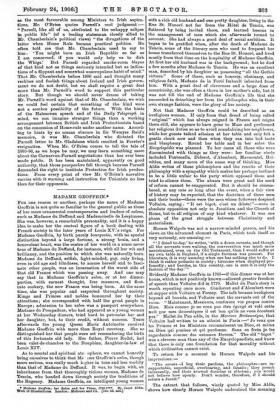MR. O'BRIEN'S RECOLLECTIONS.*
THE last phase of the Irish revolutionary movement, or what we may call the Parliamentary epoch, has already covered the lifetime of a generation, and is still in progress. Like all similar agitations, popular and not military or dynastic in origin, it has two sides, the one political and the other agrarian. Within a few years it may be possible to say how far the agrarian side gave life to the political, but at the most critical stage of the struggle it is almost impossible to disconnect the two. Since the Land Purchase Act of 1903 came into effect, they have been to a certain extent divorced, and the political agitation can no longer be carried on under the irresistible pressure applied by the necessity for sweeping land reforms. This is the cardinal fact which an historian will deduce from Mr. O'Brien's instructive volume. 'Whatever may be the natural prejudices arising from his early surroundings and later experiences, Mr. O'Brien clearly recognises the extraordinary change for the better which has taken place within twenty years in the lot of many among the Irish peasantry, and this alone should be enough to encourage those who hope for an increase of better feeling between Great Britain and Ireland, even when they are not prepared to embark upon heroic legislation to bring it about.
In the Irish Revolution, as in the French and in the Russian also, so far as we can at present disentangle the facts, there have been many classes of revolutionaries. If O'Connell may be classed with Mirabeau as a great tribune who would have fused profound loyalty to the dynasty with self-government, he has been followed by Girondins, the Mountain, and almost every subdivision of political thought which accompanies such movements. Mr. O'Brien's original views were of the Girondist type, rebellious and sentimental. Whether we have now reached a stage when the desire to found an orderly and stable system on a new economic basis will get the mastery of distracting and disabling ambitions, it is too early to say ; but we gladly welcome in Mr. O'Brien a strong force for good, so far a4 the agrarian settlement is concerned. He, at all events, had the sense to see that whatever his ultimate aims might be in politics, the arrangement of agrarian difficulties and the creation of a peasant proprietary were possibilities that might be converted into facts by the exercise on both sides of a little give-and-take. This may be branded as opportunism by extremists such as Mr. Devitt and Mr. Dillon ; but it is the beginning of statesmanship to recognise the necessity for seizing such opportunities. Herein Mr. O'Brien has acquired in the school of Parnell all that was worth his assimi- lating. In the capacity for enlisting popular sympathy and
• Recollection& By William O'Brien, 2d.P. London; Macmillan and Co. [14e. net.] engineering popular movements he had clearly little to learn from others.
As Mr. O'Brien says with much truth, Ireland has never been in want of leaders, and yet only twice in a century has she found a leader. It was indeed one of the tragic ironies of her history, and (as we think) one of those strokes of luck with which the British Empire has been often favoured, that the great statesman who is the hero of this volume should have shattered by his own perverseness the Parliamentary instru- ment he had created. If Mr. O'Brien should ever trace the history of the Irish Party for another twenty years from the point at which he leaves it here, his own election for his native town of Mallow in 1883, he will have a tale to tell sur- passing in interest that which he has already given us. Few men are better qualified to tell it, if we may judge by these memoirs. Remembering some scenes in his past career, we confess that we expected to find this book far less entertaining, as well as less critical, than it is. We anticipated something of what he himself with perfect truth describes as his "head- long, shouting, wildly-gesticulating elocutionary manner" to be transferred to his writing. On the contrary, we have a narrative that can be read with pleasure from beginning to end. Mr. O'Brien is, of course, uncompromising in his Nationalism, and unsparing in his condemnation of English methods of government; sometimes unjust to opponents and too merciful to his own friends ; but he frequently sees and calls attention to the humours of a situation when they tell against him, and he bestows a good deal of well-deserved criticism upon the Nationalists. In fact, both in tone and style the book is a pleasant one, and every one who wishes to form a clear idea of the Nationalist case against the British Government from 1865 to 1883 should make a point of studying it, though unquestionably it requires careful check- ing from other sources.
From his boyhood Mr. O'Brien was in the midst of political agitation, for his elder brother was a physical-force man in the early days of Fenianism. The Fenian rising itself was in the end an absurdity. As Mr. O'Brien says, the whole conspiracy was a "secret de Polichinelle " long before it came to an open outbreak, and when it did "the performance was organised by a group of American officers in order not wholly to disappoint the somewhat noisy promises made in the chaleur communicative of American mass meetings." But unfortunately the lesson deduced from these sporadic and abortive outbreaks was that the Disestablishment of the Irish Church and the Land Act of 1870 were measures of reform due, not to an English sense of justice, but to Irish acts of violence. Mr. O'Brien is a born journalist, and before he had been long at his business secured a lucrative post, and work he enjoyed, on the Freeman's Journal. His entry into politics, properly so called, only dates from 1881, when, at the request of Parnell, and much against his own will, be became editor of the Irishman, which had been bought by Parnell at a price greatly above its value from Richard Pigott of sinister reputation. Previously to this Mr. O'Brien had made a considerable reputation as a descriptive writer. He had acted as correspondent for the Freeman's Journal on estates where evictions were being carried on, and was thus well known to the Irish leader, who had resolved to institute his own newspaper so soon as he found the Freeman's Journa2 hostile to his Parliamentary movement, or at all events luke- warm in its support. The latter half of this volume describes in detail the struggle between Parnell and the Gladstone Government from 1880 to 1883. In all these conflicts Mr. O'Brien was deeply concerned, chiefly as the mouthpiece of the Irish Party in the Press. He was at one time im- prisoned in Kilmainham, and saw his paper suppressed and issued clandestinely from various centres in England, and even on the Continent. It was printed at different times in London, Liverpool, Manchester, Glasgow, and Paris, and smuggled into the country by ingenious devices, the description of which is highly entertaining. In - the end the victory of the Irish Party was complete. By the Kilmainham Compact the leaders were released, and it is abundantly clear that Gladstone was by that time already converted to the belief in the necessity for Home-rule, which he only revealed to the world three years later. Here, again, the strange irony of Irish destiny stepped in with the Phoenix Park murders, and the work of conciliation was wrecked.
Writing of the time when Mr. Chamberlain was regarded-- as the most favourable among Ministers to Irish aspira- tions, Mr. O'Brien quotes Parnell's cool judgment :— 4' Parnell, like all of us, attributed to the unhappy eclipse in public life" (of a leading statesman closely allied to Mr. Chamberlain's political views) "the divagations of the latter when Home Rule became practical politics. He often told me that Mr. Chamberlain used to say to You might have an Irish Republic so far as I am concerned, if you would only help us to dish the Whigs.' But Parnell regarded smoke-room blague of that kind not as things seriously intended but as indica- tions of a flippant and somewhat unscrupulous habit of mind." That Mr. Chamberlain before 1886 said and thought many reckless and foolish things about Ireland and Irish govern- ment we do not doubt, but we shall require a great deal more than Mr. Parnell's word to support this particular story. But though we should never dream of taking Mr. Parnell's word against that of Mr. Chamberlain, we wish we could feel certain that something of the kind were not a sombre possibility of the future. With the hints of the Halesowen speech and of the Daily Telegraph in mind, we can imagine stranger things than a working arrangement between British and Irish Protectionists based on the concession of Home-rule under another name. Accord- ing to hints by no means obscure in Sir Wemyss Reid's memoirs, it was Mr. Chamberlain who dictated the Parnell letter to Mr. Gladstone which resulted in Forster's resignation. When Mr. O'Brien comes to tell the tale of 1885-86, as we hope he may, we may learn something more about the Carnarvon-Parnell negotiations than has ever been made public. It has been maintained, apparently on good authority, that those pourparlers fell through because Parnell demanded the right to institute Protection for Irish produc- tions. From every point of view Mr. O'Brien's narrative carries with it warning and instruction for Unionists no less than for their opponents.











































 Previous page
Previous page